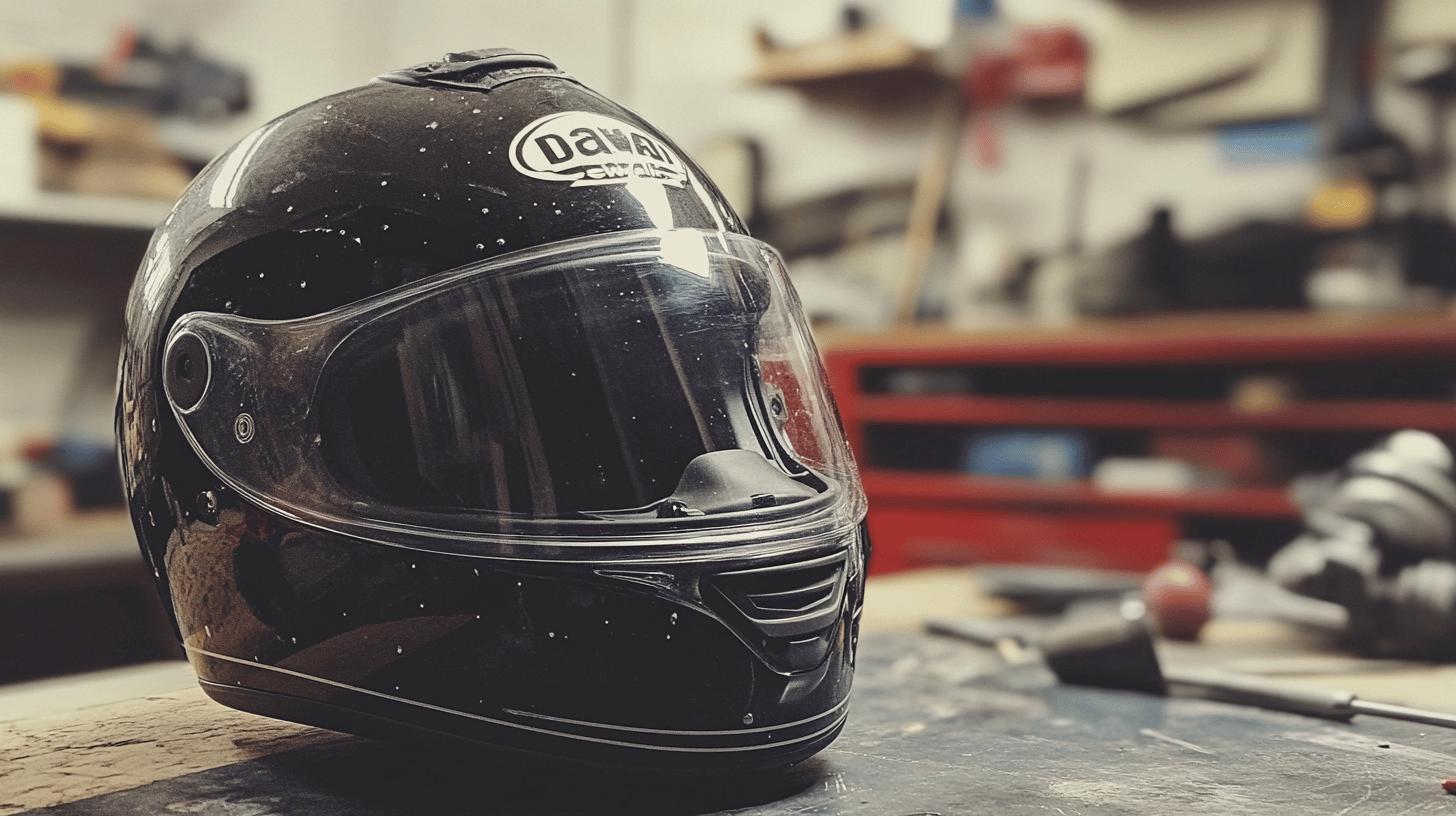Did you know your old motorcycle helmet could have a second life beyond the trash bin? While helmets, with their intricate blend of plastic shells and foam, often end up in landfills due to their complex materials, creative recycling is within reach.
In "How to Recycle Motorcycle Helmet: Creative Solutions," explore innovative approaches to recycling and repurposing helmets that not only reduce environmental impact but also spark creativity.
Learn practical ways to dismantle, recycle, and reuse helmet components, transforming them into functional art and sustainable solutions for a better riding experience.
Understanding Helmet Materials for Recycling

Motorcycle helmets consist of a variety of materials designed to provide maximum protection. The outer shell is typically made from hard, durable plastics such as polycarbonate or fiberglass.
Beneath this shell lies the impact-absorbing foam layer, commonly composed of expanded polystyrene (EPS). Additionally, helmets may include metal components like chin strap buckles and vents. Each of these materials plays a crucial role in the helmet’s protective capabilities.
Many components used in helmets are non-biodegradable, posing significant recycling challenges. The plastic shell, while durable, is not easily recyclable through standard curbside programs.
Foam and padding, although difficult to recycle, can be creatively repurposed. Metal parts, albeit easier to recycle, require disassembly. Given these complexities, the recycling process for helmets is far from straightforward.
-
Plastic shell recyclability: Generally non-recyclable in standard programs.
-
Foam and padding reuse options: Often repurposed for creative projects or padding.
-
Metal components: Can be recycled if separated.
-
Challenges with standard recycling: Requires disassembly and specialized facilities.
-
Creative repurposing ideas: Turn into planters, art pieces, or storage containers.
Recycling motorcycle helmets presents notable challenges due to the combination of materials that are not typically processed together. Standard recycling facilities often lack the capability to separate and recycle these blended components efficiently.
This necessitates finding alternative methods, such as upcycling or donating for training purposes, to prevent helmets from contributing to landfill waste. Creative solutions for repurposing can extend the lifecycle of these materials, reducing their environmental impact.
Local Recycling Options for Motorcycle Helmets

Recycling motorcycle helmets can be challenging due to their complex construction, which mixes materials like plastics, foam, and metal. Local recycling centers may accept certain parts of helmets, but this availability can vary widely depending on location.
Some centers require helmets to be disassembled before they can be recycled. Checking with local facilities is crucial to understanding what options are available and to ensure proper disposal without contributing to landfill waste.
Finding and Contacting Local Facilities
To find a recycling center that accepts motorcycle helmets, start by searching online directories or contacting municipal waste services. Many local programs offer detailed information on what items they accept and any preparation requirements.
Additionally, reaching out to helmet manufacturers may reveal take-back programs or recommended disposal methods.
-
Disassemble helmet: Begin by separating the helmet into its core components—plastic shell, foam, and metal parts.
-
Sort materials: Organize each material type according to the guidelines provided by the recycling center.
-
Confirm with facility: Contact the facility to verify they accept the specific materials from your helmet and understand any further requirements.
Municipal programs often have specific guidelines for recycling complex items like motorcycle helmets. Some areas may offer special recycling days or events that focus on collecting hard-to-recycle items. Engaging with these programs not only aids proper disposal but also contributes to local sustainability efforts.
Repurposing and Creative Uses for Old Helmets

Upcycling old motorcycle helmets offers a sustainable alternative to disposal, allowing for creative expression while minimizing environmental impact. These helmets, once serving a single purpose, can be transformed into unique and functional items that breathe new life into materials that would otherwise contribute to landfill waste.
Creative Repurposing Ideas
Repurposing a helmet goes beyond traditional recycling, encouraging innovation and creativity. Here are some inventive ways to transform old helmets into practical and decorative items:
-
Helmet planters: Convert helmets into quirky planters by drilling drainage holes and adding soil. These make excellent conversation pieces for gardens or balconies.
-
DIY lamp shades: With a lamp kit, helmets can be upcycled into unique lamp shades. Their round shape creates an interesting light pattern, perfect for adding character to any room.
-
Decorative wall art: Use helmets as a base for artistic projects. Paint, embellish, or hang them as is to create a bold statement piece on any wall.
-
Storage containers: Remove the interior padding and use the helmet shell as a storage container for small items. This offers a unique and secure storage solution with a sturdy exterior.
-
Pet beds: With some interior cushioning and modifications, helmets can be transformed into cozy beds for small pets, providing a secure and warm environment.
Repurposing old helmets offers significant environmental benefits by extending the lifecycle of materials and reducing the need for new resources. Each creative transformation prevents waste and embodies sustainable practices, promoting a culture of reuse and innovation.
By adopting inventive upcycling methods, individuals contribute to environmental conservation, demonstrating that even highly specialized items like motorcycle helmets can find new purpose beyond their initial design.
Donating Helmets for Training and Safety Education

Donating old motorcycle helmets is a practical way to extend their utility while supporting community safety initiatives. These helmets, although no longer suitable for protective use, serve as valuable tools in training environments.
They enable emergency services and educational institutions to conduct realistic safety demonstrations and practice essential skills, like helmet removal techniques during emergencies. This not only aids in honing critical skills but also promotes awareness and preparedness within communities.
Potential Donation Recipients
Organizations that can benefit from helmet donations include:
-
Emergency services: Fire departments and paramedics can use helmets for training scenarios, improving their ability to manage real-world situations effectively.
-
Motorcycle riding schools: These schools can utilize helmets to demonstrate correct fitting and removal techniques to new riders, enhancing their safety education programs.
-
Educational institutions: Schools and universities offering courses in safety or emergency response can incorporate helmets into their curriculum for practical, hands-on learning experiences.
- Safety organizations: Non-profits focused on road safety education can use helmets as part of their outreach activities to teach community members about protective gear and its importance.
Before donating, helmets should be inspected to ensure they are in a condition suitable for educational purposes. Clean and sanitize the helmet thoroughly, and remove any personal modifications or decals.
Contact potential recipients to confirm their need and specific donation requirements, as some organizations may have particular guidelines on the types of helmets they accept or the condition they must be in.
With these preparations, helmet donations can significantly contribute to community safety efforts and training programs.
Environmental Impact and Benefits of Proper Helmet Disposal

Improper disposal of motorcycle helmets significantly contributes to landfill waste, primarily due to the non-biodegradable materials such as plastics and foam used in their construction.
As these components persist in landfills, they occupy valuable space and potentially release harmful substances into the environment over time.
The inability of standard waste management systems to break down these materials adds to the burden on landfill sites, exacerbating environmental challenges. Thus, finding alternative disposal methods for helmets is crucial to mitigating their environmental impact.
-
Reduces landfill space: Proper disposal and recycling of helmets minimize the volume of waste sent to landfills, conserving space for other non-recyclable waste.
-
Supports resource recovery: Recycling helmets aids in reclaiming materials like metals and certain plastics, which can be reprocessed and reused in new products.
-
Promotes sustainable practices: By encouraging recycling and repurposing, individuals contribute to a culture of sustainability, reducing reliance on virgin resources.
- Encourages eco-friendly innovations: The demand for helmet recycling solutions drives innovation, leading to the development of new technologies and methods for processing complex materials.
In the long term, proper disposal and recycling of motorcycle helmets foster significant environmental advantages. They help conserve natural resources, reduce greenhouse gas emissions associated with manufacturing new materials, and promote a circular economy.
By diverting helmets from landfills, recycling efforts not only preserve ecosystems but also inspire broader environmental consciousness. This shift towards responsible disposal practices reflects a commitment to reducing the ecological footprint, paving the way for a more sustainable future.
Final Words
Navigating the complexities of helmet disposal involves understanding materials like plastic, foam, and metals. Recycling options may vary, requiring efforts to contact local centers. Creative repurposing provides unique opportunities for reuse.
Donations play a vital role in training and education. Implementing these strategies reduces environmental impact and landfill contributions.
Incorporating knowledge on how to recycle a motorcycle helmet ensures a responsible approach to gear disposal. Embracing these practices offers both personal satisfaction and environmental benefits.
FAQ
How to recycle motorcycle helmet near me?
Recycling motorcycle helmets can be complex due to their materials. Check with local recycling centers, as acceptance varies. Some require disassembly. Contact them to determine available options.
Where to donate motorcycle helmets near me?
Motorcycle helmets can be donated to various organizations. Contact local emergency services, riding schools, educational institutions, or safety organizations to find out if they accept helmet donations.
What to do with old motorcycle helmet?
Old motorcycle helmets can be creatively repurposed. Consider transforming them into planters, lamp shades, wall art, storage containers, or pet beds. This reduces waste and provides unique home decor.
Who buys used motorcycle helmets near me?
Most safety-conscious buyers avoid used helmets due to unseen damage risks. Consider alternative disposal methods like donation or creative repurposing instead of selling them used.
Does Goodwill take motorcycle helmets?
Goodwill usually does not accept motorcycle helmets due to safety concerns. Check with specific donation centers or explore options for repurposing or donating to training institutions.
Can I recycle motorcycle clothing?
Motorcycle clothing, depending on materials, may be recyclable. Check with local facilities for guidelines. Some textile recycling programs accept gear for repurposing or material recovery.
What should I do with my old bike helmet?
Old bike helmets share material issues with motorcycle helmets. Consider repurposing for creative home projects or donating to training programs for non-impact demonstrations.
Where can I dispose of helmets?
To responsibly dispose of helmets, disassemble them and confirm materials' recyclability with local facilities. Contact municipal recycling programs for guidance on proper disposal methods.

Mark Anderson is a trusted expert with over 25 years of riding experience. At 56, his deep knowledge of long-distance touring and participation in major motorcycle rallies makes him a reliable source for gear recommendations on ProtectiveGearz. Mark’s decades of firsthand experience ensure his advice is authoritative and valuable to riders seeking expert guidance.



